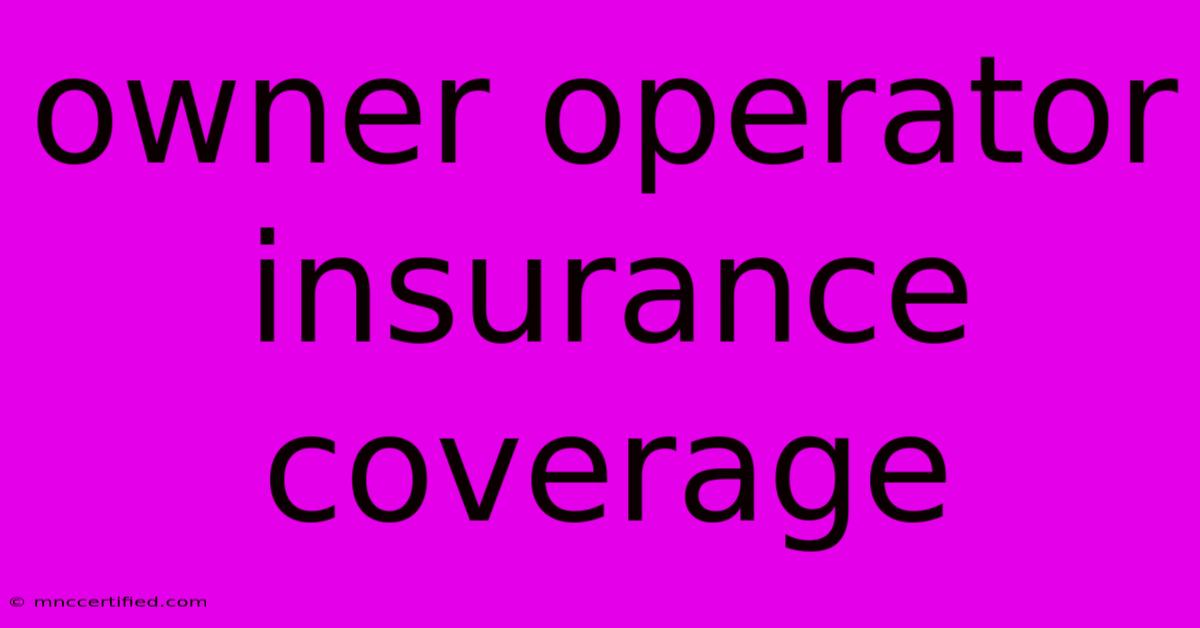Owner Operator Insurance Coverage

Table of Contents
Owner-Operator Insurance Coverage: A Comprehensive Guide
Being an owner-operator offers freedom and independence, but it also comes with significant responsibility. Protecting your business and livelihood requires a robust insurance strategy. This comprehensive guide will delve into the essential owner-operator insurance coverage you need, helping you navigate the complexities and make informed decisions.
Understanding Your Risks as an Owner-Operator
Before diving into specific policies, it's crucial to understand the unique risks faced by owner-operators. These risks often extend beyond those faced by employees of larger trucking companies. You are responsible for:
- Your vehicle: Damage to your truck, trailer, or other equipment represents a significant financial loss.
- Cargo: If you haul freight, you're liable for any damage or loss.
- Accidents: Collisions, injuries, and even property damage caused by your operation can lead to substantial legal and financial repercussions.
- Liability: You're responsible for your actions and the actions of anyone operating your vehicle with your permission.
Essential Insurance Coverage for Owner-Operators
Choosing the right insurance is paramount. Here’s a breakdown of key coverages:
1. Bobtail Insurance:
This critical coverage protects you when your truck is not connected to a trailer. Many general liability policies won't cover you during bobtail operations, leaving you vulnerable in case of accidents. Bobtail insurance bridges this gap, providing liability coverage for damages and injuries caused while operating your truck without a trailer. This is essential for owner-operators, who often operate in this manner.
2. Cargo Insurance:
If you haul freight, cargo insurance is non-negotiable. This policy protects you against loss or damage to the goods you're transporting. It covers various scenarios, including accidents, theft, and even weather-related damage. The coverage amount should reflect the value of the cargo you typically haul. Negotiate with your insurer to find the right level of protection.
3. Physical Damage Insurance (Collision and Comprehensive):
This protects your vehicle from damage caused by collisions, accidents, and other events like fire, theft, and vandalism. Collision coverage pays for repairs or replacement after a collision, regardless of fault. Comprehensive coverage handles damage from events other than collisions. This is crucial for protecting your most valuable asset - your truck.
4. General Liability Insurance:
This coverage protects your business from financial losses due to third-party claims of bodily injury or property damage. This can include claims arising from accidents involving your truck, injuries on your property (if applicable), or even product liability if you offer additional services. This is vital for safeguarding your business against potentially crippling lawsuits.
5. Commercial Auto Insurance:
This is the cornerstone of your insurance program. Commercial auto insurance provides liability coverage for accidents you cause while operating your vehicle for business purposes. It also typically includes uninsured/underinsured motorist coverage, protecting you if you're involved in an accident with an at-fault driver who lacks adequate insurance. Ensure your policy limits are high enough to cover significant claims.
6. Occupational Accident Insurance:
This insurance covers medical expenses and lost income resulting from accidents or injuries sustained while performing your job duties. This is particularly crucial for owner-operators who are self-employed and don't have employer-sponsored benefits.
Finding the Right Owner-Operator Insurance
Shopping for insurance can seem daunting, but following these steps will help:
- Compare quotes: Get quotes from multiple insurers to find the best rates and coverage options.
- Review policy details: Carefully review policy documents to understand coverage limits, exclusions, and deductibles.
- Consider your specific needs: Choose policies that align with your unique risks and operating conditions.
- Check insurer ratings: Look into the financial stability and reputation of insurance companies before committing.
Beyond the Basics: Additional Considerations
- Umbrella insurance: This provides extra liability coverage beyond your primary policies, offering an additional layer of protection against substantial claims.
- Workers' compensation insurance: If you employ others, workers' compensation insurance is mandatory in most jurisdictions.
Protecting your business as an owner-operator is crucial for long-term success. By carefully considering these essential insurance coverages and following the tips outlined above, you can create a robust insurance strategy that mitigates risk and safeguards your future. Remember, choosing the right insurance is an investment in your business and your peace of mind.

Thank you for visiting our website wich cover about Owner Operator Insurance Coverage. We hope the information provided has been useful to you. Feel free to contact us if you have any questions or need further assistance. See you next time and dont miss to bookmark.
Featured Posts
-
Nfl Recap Titans 13 Vikings 23
Nov 18, 2024
-
Examining Bengals And Chargers Matchups
Nov 18, 2024
-
George Kittle Out 49ers Injury Report
Nov 18, 2024
-
Roy Keane On Future Son In Laws Debut
Nov 18, 2024
-
Danny Jones Wayne Rooney Night Out
Nov 18, 2024